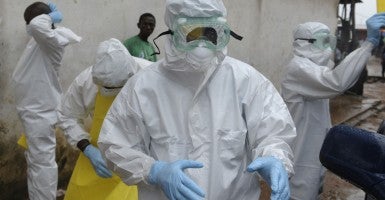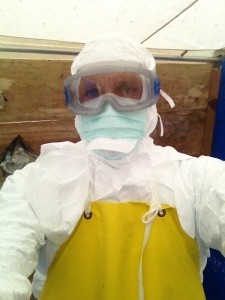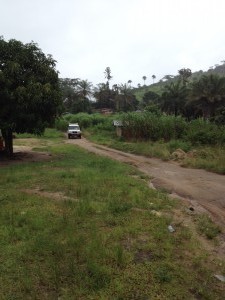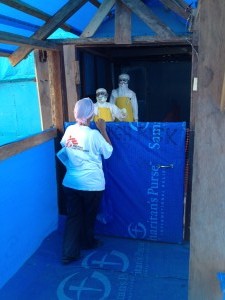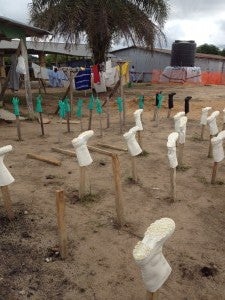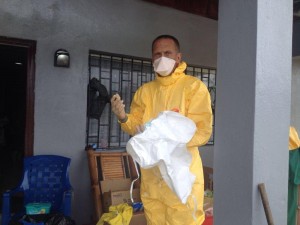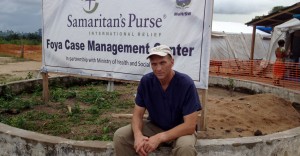Dr. Kent Brantly, the American doctor infected with Ebola while working in West Africa, only saw Tim Mosher’s eyes.
As part of his mission in Liberia with the nonprofit aid group Samaritan’s Purse, Mosher treated Brantly, a colleague whom he had never formally met but whose life he was now helping save.
With six or so other aid workers, Mosher stayed at Brantly’s bedside and intravenously delivered him ZMapp, an experimental medicine that had never before been tested on humans.
“I thought he might die that night,” recalled Mosher, who was wearing a full-body suit, face mask, two pairs of gloves and goggles—only his eyes visible—to avoid contracting the illness that struck Brantly, a doctor with Samaritan’s Purse.
After spending 21 days in quarantine upon returning from Africa, Mosher spoke with The Daily Signal about his unplanned contact with Brantly, who ultimately survived Ebola after finishing his treatment in the United States.
Thursday, Mosher drove to North Carolina from his hometown of Lima, Ohio, for a reunion with aid workers who recently treated Ebola in Liberia.
There, during the two-day event, Mosher hoped to finally speak with Brantly for the first time.
“It would be wonderful,” said Mosher, who returned home Aug. 2.
Treating Brantly, and a second American aid worker and eventual Ebola survivor, Nancy Writebol, was the second chapter of Mosher’s trip to Liberia.
>>>Ebola Survivor Thanks God and ‘Thousands and Thousands of Prayers’ for Saving His Life
Mosher, a nurse practitioner, medical volunteer and former fireman, traveled to Liberia July 25 as part of the Samaritan’s Purse International Crisis Response Team.
As a man of faith, Mosher is a veteran of overseas volunteer aid missions, and his latest trip required him to treat patients at a clinic in Foya, Liberia—“the jungle,” as Mosher affectionately calls it.
Mosher has brought aid to Haiti 10 times since a 2010 earthquake, and he’s also volunteered in Peru and Lebanon. But he said he was not prepared for Ebola.
To learn about Ebola, a virus he knew little about and had never treated, Mosher had to read a 100-page information packet on the flight to Africa.
The Ebola outbreak, which began close to the borders of three neighboring countries—Guinea, Sierra Leone and Liberia—and spread quickly from villages to cities, has killed 1,900 people.
Ebola has killed 1,900 people.
The World Health Organization warns that more than 20,000 people could become infected.
>>>Q&A: Ebola in Africa Not Yet a National Security Issue
“Ebola is much more sobering because of the nature of the illness,” said Mosher, noting that people tend to bleed before they die. “It’s unlike anything else. It’s horrific. It’s hellish, it’s awful.”
Working among 20 American team members, and also, Liberian locals with four-year medical degrees who Samaritan’s Purse hires, Mosher began his mission in Foya, inside a clinic with concrete floors, a tin roof, tarp barriers between rooms and no windows.
His mission was to provide support to the local health-care workers, so they could learn to give aid on their own.
But most of all, the Samaritan’s Purse team, which partners with Doctors Without Borders, documents everything in sight.
Mosher said his team confirmed dozens of cases per day, determined through a blood test.
“But the numbers are always shaky,” Mosher said. “You have to assume they are underreported.”
Ebola is especially tricky, Mosher says, because, unlike a cold, the virus does not start off being especially contagious.
>>>CDC Chief: Ebola a ‘Scary’ Disease, but ‘We Can Stop It’
As the virus develops, with symptoms such as diarrhea, vomiting and severe tiredness, it becomes progressively contagious.
A dead body is “radioactive.”
“Bodies don’t bother me,” Mosher said. “Suffering people bother me. Since I’m older, I understand what that means for a family.”
Tim Mosher: “Bodies don’t bother me. Suffering people bother me.”
The Samaritan’s Purse outreach team, of which Mosher was not a part, went into nearby villages to educate the people still there—and to pick up bodies.
One day, the outreach team traveled to a village one-and-a-half hours from Foya.
Skeptical locals fearful that the aid workers were carrying the virus attacked the outreach team with rocks, destroying their vehicle.
Despite the hostility, Mosher said he felt no animosity toward the locals.
He was just there to do a job—to save them.
“I had two fears,” Mosher said. “The fear of getting Ebola. And the fear of failing at my duties. You worry you might have to abandon the patients because you’re not up to the task. The patients were my concern.”
After spending four days in Foya, Mosher’s Samaritan Purse team pulled out—overwhelmed —well short of the three weeks they were supposed to stay there.
As part of his job there, Mosher interviewed patients to determine how they contracted the virus.
One patient, a 7-year-old girl, lost all six family members to Ebola.
She didn’t really talk to the aid workers, but rather stared blankly into the masked interviewers’ eyes.
Mosher says 75 percent of the patients were female.
The most common story was that the mothers cared for ill family members—feeding and bathing them—before contracting the virus themselves.
“It’s a true humanitarian disaster,” Mosher said of Ebola. “It’s not just people. The economy slows down. Every single person is touched by Ebola in someway. That’s something we haven’t experienced in America. Where you wake up and that’s all you think about. The amount of human suffering is mind boggling.”
Ebola is a “true humanitarian disaster,” Mosher says.
Mosher spent the second stage of his trip in the capital, Monrovia, with the specific mission of caring for Brantly and Writebol.
Upon arriving back to the United States, Mosher spent three weeks quarantined—one week alone in a hotel and two weeks at home.
Driving to hopefully meet Brantly, the peer and now renowned doctor he helped heal, Mosher said he would travel to the Ebola zone in West Africa again, if called.
“I hope we helped spur the use of an antibody [ZMapp] that otherwise would not have been [utilized] if not for the situation,” Brantly said.
He added: “The Liberian staff are the real heroes. I am not more special than anyone else.”
>>> Security Expert Steve Bucci Talks Ebola Threat to U.S. With Genevieve Wood































